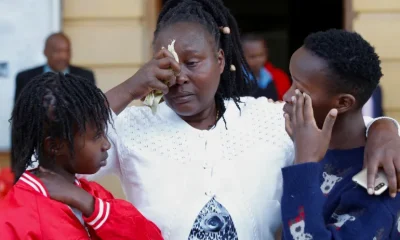News
Court Issues Arrest Warrant For Former British Soldier Accused of Murdering Woman In Nanyuki A Decade Ago
The British Army has been accused of maintaining a decade-long cover-up of the murder, with systemic failures within military accountability coming to light as new witnesses have emerged.

The long-delayed pursuit of justice for Agnes Wanjiru moved forward significantly this week when a Kenyan High Court issued an arrest warrant for a British national suspected of murdering the young mother over a decade ago.
The development represents a watershed moment in a case that has exposed both the complexities of international military cooperation and the persistent challenges faced by victims’ families seeking accountability.
On September 15, Justice Alexander Muteti granted the Director of Public Prosecutions’ application for an arrest warrant against the unnamed British citizen, ruling that murder constitutes an extraditable offense and that sufficient probable cause exists to institute formal charges.
The court documents specify that “on the night of March 31/ April 1, 2012, at Lions court lodge in Nanyuki within Laikipia county, you murdered Agnes Wanjiru Wanjiku.”
The case stems from the tragic death of Agnes Wanjiru, a 21-year-old freelance hairdresser and mother to a four-month-old infant, who vanished after spending an evening at the Lions Court Lodge in Nanyuki.
She was last seen leaving the hotel with a British soldier from the Duke of Lancaster Regiment.
Two months later, her body was discovered in a septic tank 50 metres from the hotel room, with an autopsy report showing she had been stabbed multiple times.
The timing and location of Wanjiru’s death were particularly significant. Nanyuki hosts the British Army Training Unit Kenya (BATUK), a permanent garrison that has operated since colonial times.
The Lions Court Lodge, where Wanjiru was last seen alive, sits in close proximity to this military facility, making it a frequent gathering place for off-duty British soldiers.
What has made this case particularly troubling for Wanjiru’s family and human rights advocates is the alleged institutional response to her murder.
The British Army has been accused of maintaining a decade-long cover-up of the murder, with systemic failures within military accountability coming to light as new witnesses have emerged.
Despite a Kenyan inquest finding that Wanjiru had been “unlawfully killed” and the judge presiding finding that British soldiers had murdered her, no soldiers have been charged or convicted for the killing.
The diplomatic and legal complexities surrounding the case have created additional obstacles.
While the UK government has previously indicated its willingness to cooperate with extradition requests, the formal process has been slow to materialize.
As recently as 2024, UK officials revealed that Kenya was yet to formally request extradition of suspects, though they indicated the UK would comply with such requests.
The recent court ruling marks the first concrete legal step toward bringing the suspect to trial in Kenya. Prosecutors Vincent Monda and Gikui Gichuhi informed the court that despite extensive investigations, the suspect has remained abroad and has not presented himself to Kenyan authorities.
The arrest warrant now paves the way for formal extradition proceedings.
For Wanjiru’s family, the development comes after years of frustration and unfulfilled promises.
Earlier this year, UK Defence Secretary John Healey met with Wanjiru’s family during a visit to Kenya, but family members expressed that they had been subject to “too many empty promises” regarding investigations into her death.
The British Army’s presence in Kenya, formalized through training agreements, has been scrutinized following allegations of misconduct by personnel stationed at BATUK. Wanjiru’s murder became emblematic of concerns about military personnel operating with apparent impunity in host countries.
The legal proceedings will now move forward with extradition efforts, though the timeline remains uncertain. International extradition processes can be lengthy and complex, particularly when they involve military personnel and questions of jurisdiction.
The case returns to court on October 21, 2025, for further directions.
Agnes Wanjiru’s death occurred when she was building a life as a young entrepreneur and mother.
Her family’s thirteen-year quest for justice reflects broader challenges faced by families seeking accountability when alleged perpetrators are foreign nationals with institutional protection.
The arrest warrant represents not just a legal milestone, but a recognition that justice delayed should not mean justice denied.
As this case moves toward what may finally be its resolution in a Kenyan courtroom, it serves as a reminder of the human cost of impunity and the persistence required to hold powerful institutions accountable, regardless of the nationality or status of those involved.
Kenya Insights allows guest blogging, if you want to be published on Kenya’s most authoritative and accurate blog, have an expose, news TIPS, story angles, human interest stories, drop us an email on [email protected] or via Telegram
-

 Grapevine4 days ago
Grapevine4 days agoAlleged Male Lover Claims His Life Is in Danger, Leaks Screenshots and Private Videos Linking SportPesa CEO Ronald Karauri
-

 Lifestyle7 days ago
Lifestyle7 days agoThe General’s Fall: From Barracks To Bankruptcy As Illness Ravages Karangi’s Memory And Empire
-

 Americas2 weeks ago
Americas2 weeks agoEpstein Files: Bill Clinton and George Bush Accused Of Raping A Boy In A Yacht Of ‘Ritualistic Sacrifice’
-

 Business2 weeks ago
Business2 weeks agoCooking Fuel Firm Koko Collapses After Govt Blocks Sh23bn Carbon Deal
-

 Business2 weeks ago
Business2 weeks agoABSA BANK IN CRISIS: How Internal Rot and Client Betrayals Have Exposed Kenya’s Banking Giant
-

 Investigations1 week ago
Investigations1 week agoEpstein Files: Sultan bin Sulayem Bragged on His Closeness to President Uhuru Then His Firm DP World Controversially Won Port Construction in Kenya, Tanzania
-

 News2 weeks ago
News2 weeks agoAUDIT EXPOSES INEQUALITY IN STAREHE SCHOOLS: PARENTS BLED DRY AS FEES HIT Sh300,000 AGAINST Sh67,244 CAP
-

 Business1 week ago
Business1 week agoKRA Can Now Tax Unexplained Bank Deposits

























